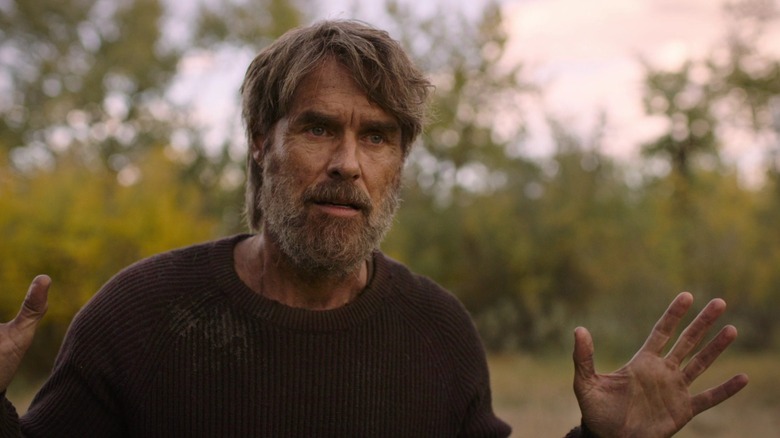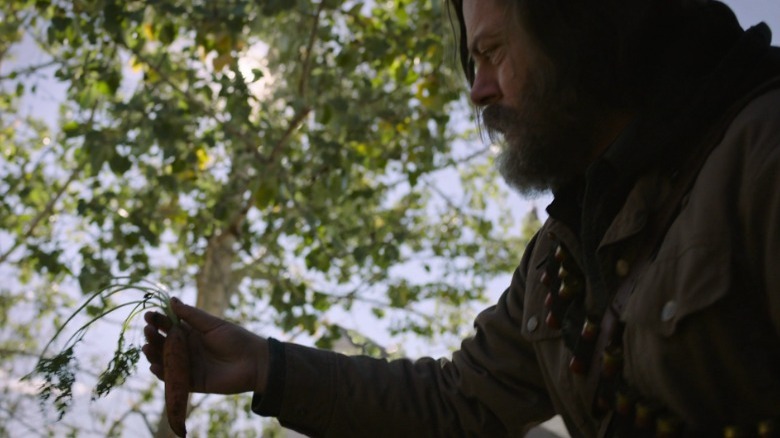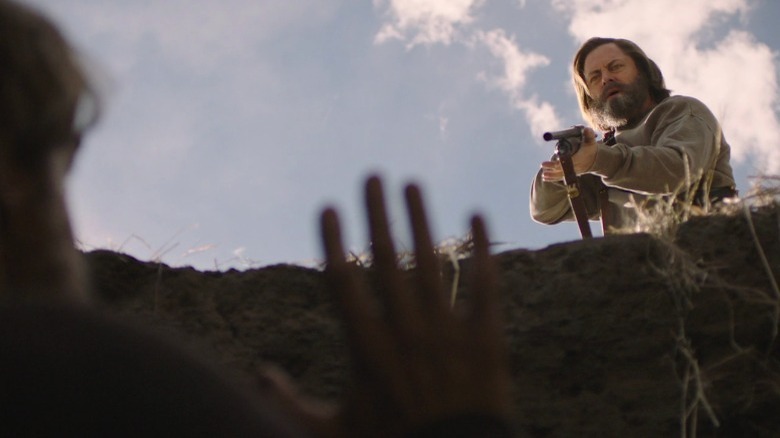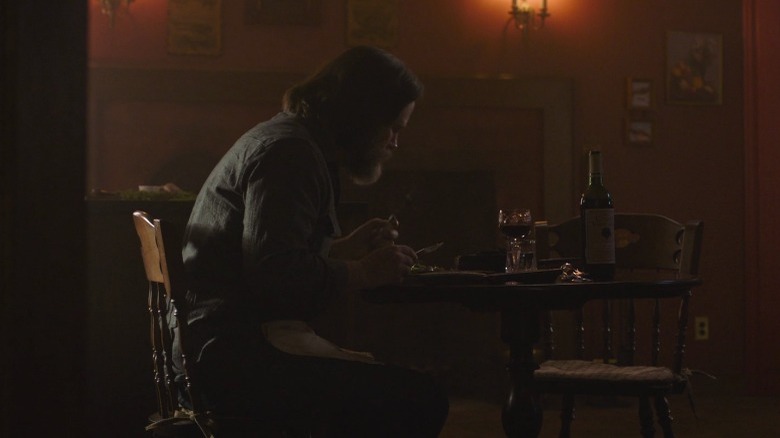Why Bill And Frank's Relationship In HBO's The Last Of Us Matters, And What TV Can Learn From It
This post contains spoilers for the latest episode of "The Last of Us."
It's still only January, but we already have a frontrunner for one of the best TV episodes of the year. The third chapter of "The Last of Us" doesn't give fans a straightforward adaptation of the beloved Naughty Dog game on which it's based. Instead, series co-creators Neil Druckmann and Craig Mazin deliver an absolutely emotionally leveling 75 minutes of television. Bill (Nick Offerman) and Frank (Murray Bartlett) are no longer a caustic couple whose relationship comes to a bitter end. Instead, they're the subject of one of the most delicately told self-contained love stories I've ever seen.
Episode three of "The Last of Us" is groundbreaking for a few reasons. In the long run, it'll hopefully be remembered as proof that not only can video games be properly adapted for TV (which has been proven before), but also that the games themselves don't need to be taken as gospel. In the past, game adaptations have been lambasted for changing too much from their source material, but in this case, the changes not only suit the already-great overarching story, but deepen it considerably. "The Last of Us" confirms that when a video game adaptation fails, it's not simply because it didn't paint by numbers the same way its predecessor did. It's because it didn't capture the soul of the game. "The Last of Us" episode three undoubtedly still captures the soul of its game, but it also does so much more.
Some love stories are really about trust
But Bill and Frank's story matters for reasons that go way beyond what a video game-loving audience may or may not want. The episode is directed by Peter Hoar, who won a BAFTA for his work on the 2021 limited series "It's a Sin." That show is among the most tenderly and truthfully-realized portraits of queer community I've ever seen, so it's no surprise that Hoar here captures the love between this unlikely couple with just as much warmth and nuance. But while "It's A Sin" portrayed a group of diverse young Brits coming into their sexuality during the onset of the AIDS epidemic, Frank and Bill's story is about a type of love that blooms later in life — with a whole lot of nurturing.
Episode three of "The Last of Us" is shot through with images that call to mind growth and opening up, from the strawberries Frank plants for Bill in secret to the window the pair leave open when they go to bed together one last time. These are tender, beautiful metaphors that perfectly capture what it feels like to fall in love — and learn to trust — when you least expect it. For a man like Bill, a paranoid, gun-toting conspiracy theorist, it's no doubt not easy to come to terms with his feelings for another man.
Indeed, it seems fitting that someone as closed off as Bill would meet his future love by holding him at gunpoint. But even more than contradicting his political ideology, his own love contradicts the protective walls he's built up around himself for years. Just as Joel's fatherly love is so powerful it can sometimes be scary, loner Bill's sudden capacity for love scares even himself. When Frank comes along, he fills a void of loneliness that Bill didn't even think he had.
The transformative power of vulnerability
For the last year or so, I've mostly forgone typical, straight couple romantic comedies in favor of digging into queer love stories, and I've found that the latter often presents a different path than the well-trod rom-com formula. Traditional romance stories about straight couples often present one or both parties as desperately looking for love, while queer romance stories often feature characters who find it regardless of whether they meant to or not.
These genre patterns may be directly tied to the idea of being in the closet, a mental and social space that often keeps a person from feeling comfortable pursuing love, or they may simply be a coincidence. Either way, I can't relate to the rom-com protagonist who huffs a sigh, lamenting a life spent fruitlessly on dating apps. I can relate to the visible tension Bill carries, his shoulders practically up to his eyeballs, as he waits for Frank's touch to give him a sort of calm he never even expected to find and never dared to ask for.
This re-imagining of Bill and Frank's story understands the weight and, yes, terror of vulnerability in a way that few love stories I've ever seen do. Shows like "Fleabag" and "You're the Worst" have similarly explored the connections between romantic love and, as writer Tim Kreider once famously put it, "the mortifying ordeal of being known," but shows that do it as well as these examples are vanishingly rare. Shows that let that connection unfold between two men in their 50s are nearly nonexistent.
Age, autonomy, and the rarity of a story like this one
What's more, few shows have ever treated the revelation of first love as something that's as pure and fragile at middle age as it would be at any other. Frank is, we learn, the first man Bill's been with, and Frank treats that fact not with judgment, but with tremendous warmth and respect. The pair share the kind of emotional nakedness that, for some people, could only come at the end of the world. They also eventually share tough conversations about aging, mental health, quality of life, and Frank's autonomy over his own body as his health declines. All of this feels exceedingly rare to witness, and "The Last of Us" executes all of it with care in an episode that completely rewrites the narrative we know — as "The Last of Us" fans and TV viewers alike.
Just as the video game version of "The Last Of Us" took genres that are typically about spectacle and turned them inward with character-driven stories, episode three of the HBO series subverts our expectations about what romance on-screen typically looks like. Instead of telling a familiar story, it tells one that feels remarkably true for its characters, tailored to their ages and unspoken histories, their fears and desires, and the ways they bring each other to life over the course of a meal and a song and, eventually, years spent together. The result is television at its best — and most touching.



